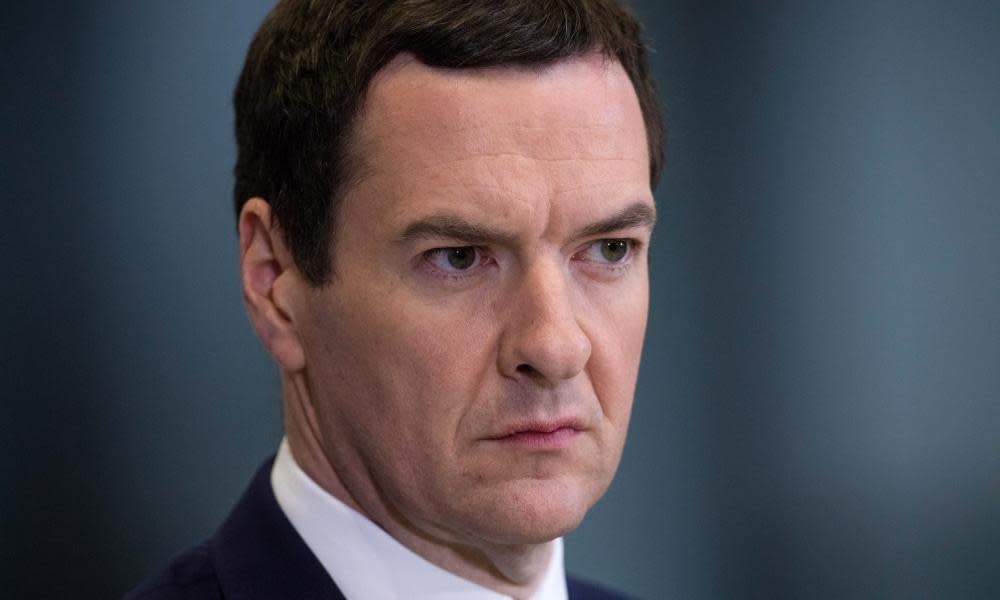Nine-jobs George has no idea about the poverty many British workers face

At the risk of adding to the Christmas repeats: what about the workers? It’s a traditional question, but a good and necessary one. The official figures seem to reveal a fairly positive picture. There are high levels of employment, while unemployment remains low in spite of economic uncertainty. Earlier this week the Office for National Statistics said that pay was now growing at an above-inflation rate of 3.3%.
But then there is the nightmare before Christmas, the reality of what working people are actually experiencing. And it is this: adjusted for inflation, people are still getting paid less on average than they were 10 years ago – almost £500 a year less, according to the Resolution Foundation. And according to the Office for Budget Responsibility, wages will not return to their pre-financial crisis peak until at least 2024. New research from the TUC has found that pay is worth a third less in some parts of the country than a decade ago. The average worker has lost a total of £11,800 in real earnings since 2008, the TUC says, the worst real-wage slump among leading economies.
That is the more rounded picture of what is going on in the labour market – quite impressive job creation, but too often at very low rates of pay. This services-driven economy of ours fills warehouses with pressured fetchers and carriers, packs out our roads with delivery drivers and cycle couriers, and makes sure you get served a drink or a meal in bars and restaurants, but it does not put enough bread on the table. The 1990s belief that “any job is better than no job” has been exposed as a (perhaps well-intentioned) delusion. Still the government repeats the claim that “the best way out of poverty is to get a job”. But given the rates of pay on offer in so many parts of the country, this simply isn’t true either.
More than half a million British workers have fallen into poverty in the last five years, according to the Joseph Rowntree Foundation, bringing the total to around four million. Feeble wage growth, in addition to reductions in tax credits, benefits cuts and the high cost of housing have combined to produce this lethal state of affairs. Some 4.5 million children are now living in poverty – nine out of 30 children in an average classroom.
It is little consolation to say that things could be worse. Without the introduction of a national minimum wage (NMW) 20 years ago there would be even more poverty pay than there is today. And this government did at least aim a bit higher when, in 2015, the then chancellor George Osborne set a target for the NMW of £9 an hour for the over-25s by 2020 (although that target is probably going to be missed).
Ah yes, Osborne. Did you know he’s just bagged his ninth job? Perhaps this is the clinching piece of evidence that times really are hard for everyone. The £650,000 a year from Blackrock and the reported £200,000 for editing the Evening Standard are apparently not quite enough. The serious point is that the failure of David Cameron and Osborne to recognise the realities of life in the economy they presided over – and they were not alone in placing too much faith in apparently reassuring aggregate data – has delivered us the fractured, unhappy country we are today.
What was the vote for Brexit if not, in large part, a rejection of the sunny economic story Dave and George were telling us all? “Project Fear” failed because so many people didn’t think things could get any worse. It was no use saying “vote remain or the country gets it”. A lot of people felt utterly got at already.
Even that positive news about a rise in the NMW was undermined by the cynical sleight of hand that accompanied it – a renaming of the NMW as a “national living wage”. There is a real living wage, calculated by social scientists at Loughborough University, and it is a good deal higher (currently £10.55 an hour in London and £9 in the rest of the country) than the fake “NLW”. This dishonest spray-job is typical of what has gone wrong with economic management in recent years. Politicians in Westminster have told the country that all is more or less fine. But the country doesn’t believe it. The queues at the food banks tell a different and more convincing story.
Most people do deserve a pay rise after years of falling real wages. But there is a lot of ground to be made up. And, sadly, 3.3% of naff all is naff all.
• Stefan Stern is a former director of the High Pay Centre

 Yahoo News
Yahoo News 
